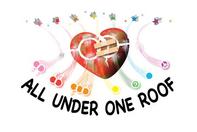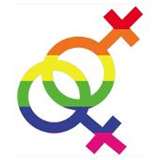All Under One Roof
    LGBT Resource Centers of Southeastern Idaho
I Might Be Lesbian
Lesbians are women who are attracted to and fall in love with other women. Lesbians feel emotionally and spiritually closer to women and prefer intimate relationships with women.
How Do I Know if I'm Lesbian?
During adolescence, most young women begin to be aware of sexual feelings and to take an interest in dating. Many young women feel physically attracted to men. But other young women feel physically attracted to women. You may notice that you feel "turned on" by other women. You may feel different from your girlfriends, like you don't fit in sometimes. When your girlfriends are checking out the guys, you may find yourself checking out other women. Going out with men may not interest you. You may find yourself wondering, "Why aren't there any men like these terrific women I keep meeting?"
You may not know what to call your feelings. You don't have to rush to decide how to label yourself right now. Sexual identity develops over time.
If you are a young person questioning your sexual orientation, you may find it useful to ask yourself who your mostly deeply felt attractions are for. Who do get crushes on most often? Who do you usually have romantic fantasies about? Who do you really wish you could spend the rest of your life – or just next weekend with the answers to these questions are often helpful in the beginning to sort out your feelings. If your answers to these questions are not clear, don't worry. You will be more certain in time of your sexual identity.
Why do people have same sex attractions?
Over the years there have been many theories about why some of the worlds population has attractions to the same sex. Basically these theories fall into one of three possibilities: nature, nurture, or a combination of the two.
Nature means you were born gay it's your nature. There seems to be some evidence from scientific research to support this theory that sexual orientation may be biologically determined. Interestingly, although there is quite a lot of talk about why gay people are gay, no one has done much research on why straight people are straight. In fact, homosexuality, bisexuality, and heterosexuality are all simply variations of human sexuality.
Nurture refers to your life experience and how it has affected your development. In the past it was assumed that if you were gay, something damaging must have happened to make you that way. Now it's widely accepted that this is not true. Our experiences both positive and negative may play a part in determining our romantic and sexual attractions, but no one is gay, lesbian, or bisexual solely because of a harmful or beneficial experience.
While some people have favored the nature theory and some the nurture, others have proposed that a combination of both the nature and the nurture are involved in determining sexual orientation. At this point no one is totally sure, though scientists are continuing to study these questions.
Am I Normal?
Yes, you are normal. Many people are lesbian. It's normal and healthy to be yourself, whether you're lesbian, bisexual, gay or straight. What's really important is learning to like yourself.
Should I try to change my sexual orientation or gender identity?
No. Efforts to do so are not only unnecessary, they are damaging. No studies have proven long-term changes in gay or transgender people. In fact, every reputable professional organization ranging from doctors, psychologists and other therapists have published statements saying that this sort of reparative therapy does not work. The fact is, most reported changes are based only on behavior and not a persons actual self-identity
I think I may be lesbian, but my religion says it is immoral.
There are faith communities that are welcoming and supportive of their LGBT members. If faith is an important part of your life, look for positive congregations to support you. Give All Under One Roof LGBT Center a call and we can help you find one.
What Is It Like to be Lesbian?
There's no right way or wrong way to be a lesbian. Growing up with society's stereotypes about lesbians might make you think you have to be a certain way if you're a lesbian. Your sexual orientation is only one part of who you are. You probably have hobbies and interests that are the same as those of some of your straight friends. Homophobia means some people don't accept lesbians bisexuals and gay men, and LGBT people often suffer from discrimination and violence. That's why there are many gay and lesbian organizations that work for gay and lesbian civil rights.
Do I need to worry about HIV and AIDS?
Everyone needs to be informed about HIV and AIDS. It's not who you are “ lesbian, bisexual, gay or straight, male or female, black or white – but what you do that puts you at risk for infection.
There are three main ways you can become infected with HIV: (1) by having unprotected sex with someone who is infected; (2) by sharing drug needles or syringes with an infected person; or (3) an infected woman can pass the virus to her baby during pregnancy or birth.
You cannot tell if someone has HIV by looking at them. The virus can be inactive for as long as ten years. Someone who looks healthy could still be infected.
Abstinence is the surest way to avoid unwanted pregnancy, HIV, and other STDs. Many young people – lesbian, gay, straight, or bisexual - choose activities other than sex to show affection, such as hugging, kissing, talking, and massage.
If you become involved in any sexual relationship-- be responsible and protect yourself and your partner. Use condoms. Remember to always use water based lubricants with condoms. Oil based lubricants can break down latex. Remember that blood-to-blood contact is the most direct route for HIV transmission. Don't share needles or syringes. Seek help from a local clinic if you are shooting or using street drugs. Learn about safer sex to protect yourself if you are sexually active. Safer sex practices include using latex condoms or dental dams to stop the transmission of the virus.
How Do I Learn To Like Myself?
Coming to terms with being lesbian can be difficult. However, many people have difficulty learning to like themselves, regardless of their sexual orientation. Many people also have difficulty understanding women who love and want to be with other women, and some lesbians may try to hide their sexual orientation. In an effort to numb the effects of societal stigma, some lesbian youth may turn to drugs and alcohol and may even attempt suicide because their situation seems unbearable.
Millions of other lesbians - just like you - lead successful, happy lives. It helps to be informed and to know that you aren't alone. Read about lesbians and lesbian culture. Learn about the history of the womens movement and lesbian history. Meeting other lesbians helps, too, because then you discover that lesbians are as diverse as any other group of people.
You can say to yourself every day, "I'm a lesbian and I'm okay." Find someone to talk to who also believes that lesbians are okay. Of course, at Kaleidoscope Youth Center, you will find many people who are very open and willing to talk about these issues with you. There are many programs and activities specifically for young people who feel just like you do.
You will find a community of support. Remember that it's normal and natural to be lesbian, just like it's normal and natural to be heterosexual.
Whom Should I Tell?
Coming out is the process of accepting yourself as a lesbian and figuring out how open you want to be about your sexual orientation. A lot of people don't understand about lesbians, and it may be hard to know who will listen and be supportive. Some friends will accept you. Others may turn away from you or tell other people without your permission. Telling family can sometimes be difficult. Some families are highly supportive, and some are not. Start slow. Chose a friend, a sibling, parent, or other adult, such as a guidance counselor, social worker in your school or in a local counseling or come to All Under One Roof LGBT Center to talk.. It's important to talk with someone you can trust because it's not normal or healthy for young people to have to keep secret such an important part of their lives.
Will I lose my straight friends?
Most teens say that they have more straight friends now that they're not only that, but their confidence increased and they felt happier since coming out. Being close to people is easier when there is nothing to hide and you'e comfortable with yourself.
Coming out at school does have its problems, especially if your school is in a small town or rural area. Kids can be very cruel, particularly when they are unsure of themselves and are looking for ways to build themselves up. The harassment can make life miserable. When making the decision to come out to friends, be careful to trust only those who will respect your privacy. Friends who gossip can cause problems, even if they don't mean to hurt you.
Some of your friends might be supportive right away. One or two might have already guessed that you're lesbian. Both guys and girls say it is generally easier to come out to girls. Some friends may wonder if your coming out to them is a way of coming on to them, which might make them feel uncomfortable. Some may wonder if they are lesbian since you're a close friend and you're gay.
Just as with your family, your friends may need time to adjust to the idea of your being lesbian. Try to think about how each friend is likely to feel and how you can let them know that you have not changed.
Where do I find friends who are also lesbians?
Finding friends who know exactly what you are going through because they've been through it or are in the process of coming out themselves is really important. An LGBT youth organization, like All Under One Roof, is a good place to start. You won't have to worry about trying to figure out whether another teen is LGBT or not. You will find new friends to share experiences with and draw support from and learn more about yourself in the process.
It may seem to you that you're the only lesbian person at your school. You're not. There are other LGBT students whom you might already know but not know that they're gay. It is sometimes difficult to figure out if someone is gay if they are not completely
Do I need to see a therapist?
Being lesbian is not a mental disorder, but for a variety of reasons, a therapist may be helpful for both you and your family. Therapy can ease the confusion and promote positive coping skills.
With support and accurate information, confusion about sexual orientation will resolve. However, you may still have feelings of isolation, no matter how comfortable you are with your sexuality. Seeking out people to talk to is a healthy response to many stressors and may allow you to cope more effectively

